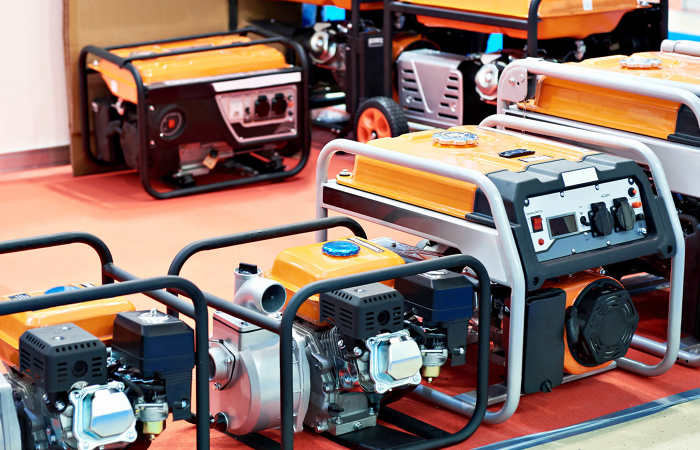Power outages can happen unexpectedly, leaving homes and businesses without electricity. Whether due to severe weather, technical failures, or other emergencies, having a reliable generator can be a lifesaver. This guide explores the best generators for power outages, focusing on various types, key features, and considerations to help you make an informed choice.
Understanding Generators
1. What is a Generator?
A generator is a device that converts mechanical energy into electrical energy. It serves as an alternative power source when the main electrical supply is interrupted. Generators come in different types, sizes, and fuel options, catering to a wide range of power needs.
2. Types of Generators
When selecting a generator for power outages, it’s essential to understand the types available:
Portable Generators: Ideal for short-term power needs, these units can be moved easily and are typically powered by gasoline or propane.
Standby Generators: Permanently installed, these systems automatically provide backup power during outages. They usually run on natural gas or propane and are suitable for larger power needs.
Inverter Generators: Known for their quiet operation and efficiency, inverter generators provide clean power, making them ideal for sensitive electronics.
Factors to Consider When Choosing a Generator
1. Power Requirements
Understanding your power needs is crucial. To determine this, list the appliances and devices you want to keep running during an outage, including:
Refrigerators
Heating and cooling systems
Lights
Medical equipment
Electronics (computers, TVs)
Calculate the total wattage required by adding the starting and running watts of these devices.
2. Fuel Type
The type of fuel your generator uses can impact convenience, cost, and availability:
Gasoline: Common for portable generators; easy to find but has a shorter shelf life.
Propane: Offers longer storage stability; suitable for both portable and standby generators.
Natural Gas: Ideal for standby generators; provides an unlimited supply as long as the utility service is active.
3. Run Time
Consider how long you may need the generator to run during an outage. Look for models with longer run times on a single tank of fuel to reduce the frequency of refueling.
4. Noise Level
Generators can be noisy, which may not be ideal in residential areas. Inverter generators are typically quieter and designed for minimal disturbance.
5. Portability
If you plan to use your generator for outdoor activities or need to move it around your property, consider its weight and whether it has wheels or handles for easy transport.
Top Generators for Power Outages
1. Honda EU2200i Portable Generator
Overview
The Honda EU2200i is a popular choice for those seeking a reliable, portable generator. Known for its quiet operation and fuel efficiency, it is perfect for residential use and outdoor activities.
Key Features
Power Output: 2200 watts (starting) and 1800 watts (running).
Fuel Type: Gasoline.
Run Time: Up to 8.1 hours on a 0.95-gallon tank.
Noise Level: As low as 48 dBA, making it one of the quietest in its class.
Pros and Cons
Pros: Lightweight, reliable, excellent fuel efficiency, and low noise.
Cons: Limited power output may not support larger appliances.
2. Generac 7043 Guardian Series Standby Generator
Overview
The Generac 7043 is a top-rated standby generator, designed for automatic power backup during outages. It’s ideal for homeowners looking for a permanent solution.
Key Features
Power Output: 22,000 watts (LP) and 19,500 watts (natural gas).
Fuel Type: Natural gas or propane.
Run Time: Continuous power supply.
Transfer Switch: Comes with a smart transfer switch for automatic operation.
Pros and Cons
Pros: High power output, automatic operation, and low maintenance.
Cons: Higher upfront cost and requires professional installation.
3. Westinghouse WGen7500 Portable Generator
Overview
The Westinghouse WGen7500 is a robust portable generator, suitable for both home use and outdoor activities. It provides ample power for essential appliances during outages.
Key Features
Power Output: 7500 watts (starting) and 6000 watts (running).
Fuel Type: Gasoline.
Run Time: Up to 12 hours on a 6.6-gallon tank.
Portability: Equipped with wheels and a folding handle.
Pros and Cons
Pros: High power output, long run time, and easy mobility.
Cons: Heavier compared to smaller models.
4. Champion 76533 Dual Fuel Generator
Overview
The Champion 76533 is a versatile dual-fuel generator, capable of running on both gasoline and propane. This flexibility makes it an excellent option for varying needs.
Key Features
Power Output: 7500 watts (starting) and 6000 watts (running).
Fuel Type: Gasoline or propane.
Run Time: Up to 8 hours on gasoline and 5.5 hours on propane.
Noise Level: 58 dBA, which is relatively quiet.
Pros and Cons
Pros: Dual fuel capability, high power output, and affordable.
Cons: Requires switching fuel types manually.
5. Briggs & Stratton 40346 Standby Generator
Overview
The Briggs & Stratton 40346 is a reliable standby generator that automatically provides backup power, making it ideal for home use.
Key Features
Power Output: 20,000 watts (LP) and 18,000 watts (natural gas).
Fuel Type: Natural gas or propane.
Run Time: Continuous operation during outages.
Smart Control: Compatible with remote monitoring apps.
Pros and Cons
Pros: High power output, automatic transfer switch, and remote monitoring.
Cons: Higher installation costs and space requirements.
Maintenance Tips for Generators
1. Regular Inspections
Conduct routine checks on your generator to ensure it operates efficiently. Inspect fuel lines, connections, and the overall condition of the unit.
2. Oil Changes
Follow the manufacturer’s guidelines for oil changes. Keeping the oil clean is crucial for engine performance.
3. Fuel Management
Store fuel properly and consider using fuel stabilizers to prolong shelf life. Regularly replace old fuel to prevent engine issues.
4. Battery Care
For standby generators, check the battery regularly and keep it charged to ensure quick startup during outages.
Conclusion
Choosing the best generator for power outages requires careful consideration of your specific needs, including power requirements, fuel type, and portability. The options presented in this guide, from portable to standby models, cater to various preferences and budgets. Investing in a reliable generator can provide peace of mind and ensure you’re prepared for any power outage, keeping your home and essential devices running smoothly.
Related topics:

